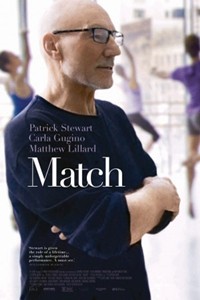 Match
Match
Starring Patrick Stewart, Matthew Lillard, and Carla Gugino
Directed by Stephen Belber
Rated R
Run Time: 92 minutes
Genre: Drama
Opens January 30th
By Eric Forthun of Cinematic Shadows
Match takes place almost entirely in an apartment, which reminds the audience of the source material's adaptation from a stage play. It recalls Roman Polanski's ensemble piece Carnage, a film that utilized a cast confined to interiors and made the most of its material, bringing every insecurity and imperfection to the surface. Here, three terrific performances emerge from the cast, with Patrick Stewart leading the way in an outstanding role that emphasizes longing, regret, and a missed opportunity. As a professor of dance at Juilliard, Stewart's Tobi Powell lives a fairly lonely life involving cross-stitching, smoking weed, and keeping to himself when not motivating young talents. One day, he's called upon by a woman (Carla Gugino) and her husband (Matthew Lillard), the former of which is working on her dissertation for dance in 1960s New York. They begin at a diner, then move to Tobi's apartment, where the interrogations grow increasingly personal and begin to reveal that something else is amiss in their journey.
Toni lived a promiscuous life in the 1960s, with many of the questions aiming at his romantic interests, particularly a young female dancer with whom he was involved with for a short while. According to him, everyone was experimenting back in those days, whether it meant with drugs, sexuality, or really any kind of lifestyle. He describes those moments in his life with fanfare and nostalgia, a clear divide in his psyche as only the audience has seen just how empty and quiet his life is today. Gugino's Lisa feels more adventurous than her husband, including smoking with Tobi, while Lillard's Mike is a police officer from Washington who isn't shy when it comes to bending or avoiding the law. Clearly everyone is hiding something from each other, so the film plays out awkwardly and unevenly for much of its opening moments. The middle act, though, particularly as the central reveal emerges and lays out all of the film's dramatic force, is especially pointed and challenging. Questions of ethics and goodness boil underneath the surface of every conversation, while sympathy and antipathy run rampant in these characters and their pasts, presents, and prospective futures.
Match features one of Patrick Stewart's best performances in his illustrious career. His character is a flamboyant bi-sexual dancer that doesn't seem to have a need to hide anything, but elements of his past that have haunted him simply cannot be avoided when examining his own actions during the 1960s. Stewart plays the role with confidence and chews every bit of scenery in the apartment; considering much of the film relies on the confinements of those walls and allows us to see every square inch of his living space, Stewart breathes life into every one of those moments. His character has a nagging place in his heart where his past continues to gnaw away at who he is and what he has become; if only, if only. That sense of personal regret and tragedy underly his character and allow Lillard in particular to dichotomize him masterfully. It's one of his finest performances as well in a career that hasn't allotted him many great roles. This is one of them. The film's conclusion is a little rushed and tied in a neat bow, but the journey is wholly fulfilling and proof that micro-budget independents can be thematically and emotionally powerful.









